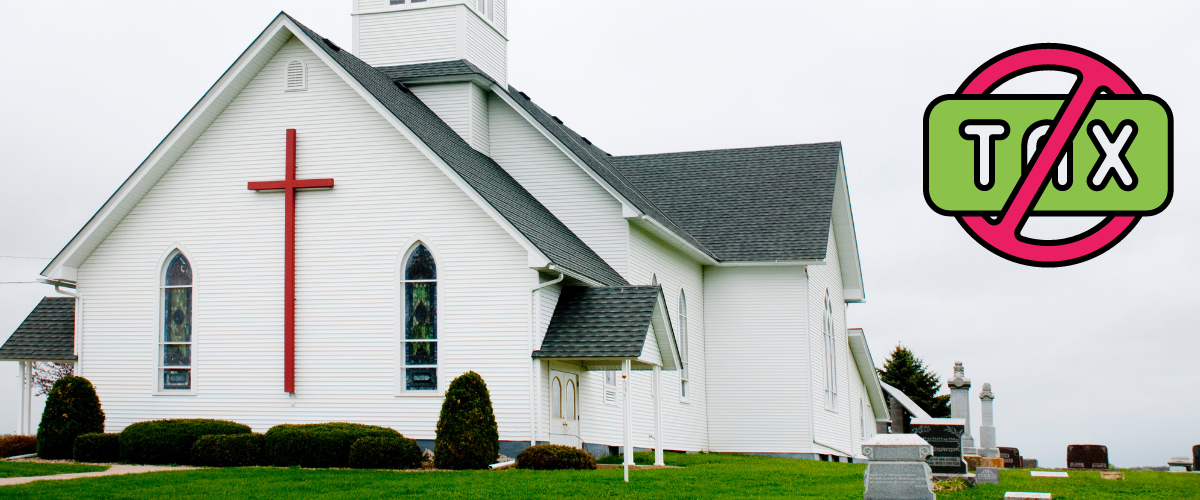
The concept of tax exemptions for churches is not just a financial matter; it's a topic deeply rooted in historical and legal frameworks. These exemptions, while providing significant benefits, also carry a set of challenges and responsibilities. This guide aims to demystify the intricacies of church tax exemptions, providing church leaders and financial administrators with the knowledge needed to navigate this complex landscape effectively.
Understanding church tax exemptions begins with recognizing their place in the broader context of nonprofit tax laws and IRS guidelines. The Internal Revenue Service (IRS) plays a pivotal role in defining and regulating these exemptions, setting the standards for what constitutes eligibility and compliance. In this guide, we will explore these aspects in detail, ensuring a comprehensive understanding of the subject.
Historical Context of Church Tax Exemptions
Church tax exemptions have a long-standing history in the United States. Rooted in the First Amendment, which prohibits Congress from making any law respecting an establishment of religion, these exemptions have been a point of legal and ethical debate. Understanding this historical context is crucial in grasping why churches are treated differently under tax laws and how this has evolved over time.
The rationale behind church tax exemptions lies in the principle of separation of church and state. By exempting religious institutions from taxes, the government avoids undue entanglement with religious activities. This separation is intended to protect both the church's independence and the state's neutrality in religious matters. Over the years, this principle has been upheld in various landmark cases, further solidifying the legal basis for these exemptions.
Eligibility Criteria: Legal Framework for Eligibility
To qualify for tax exemptions, churches must meet specific criteria defined by the IRS. These criteria are part of a legal framework that governs all tax-exempt organizations, including religious entities. Understanding these requirements is crucial for any church seeking exemption status.
The primary criterion for a church tax exemption is that the organization must be established exclusively for religious, educational, or charitable purposes. This means that the church's activities must primarily focus on religious worship or related activities. The IRS also considers other factors, such as regular congregational services, established places of worship, and a recognized creed or form of worship.
In addition to these, churches must adhere to certain financial compliance guidelines. This includes the proper management of funds, where the financial transactions and accounts must reflect the nonprofit nature of the organization. Mismanagement or diversion of funds for personal gain can lead to the revocation of tax-exempt status.
Common Misconceptions
Numerous misconceptions surround the topic of church tax exemptions. A common myth is that churches are completely free from any form of taxation. In reality, while churches are exempt from federal income tax, they may still be subject to other taxes such as payroll taxes for their employees. Additionally, churches are not automatically exempt from state and local taxes; these exemptions vary by jurisdiction and require separate applications.
Another misconception is that all church-related income is tax-exempt. However, income generated from unrelated business activities, which are not substantially related to the religious or educational purpose of the church, may be subject to unrelated business income tax (UBIT).
The Application Process: Preparing the Necessary Documents
Applying for church tax exemptions requires careful preparation and understanding of the necessary documents. The process starts with filing IRS Form 1023, the application for recognition of exemption. This form requires detailed information about the church's organizational structure, activities, finances, and governance policies.
Preparing for this application involves gathering documents such as the church's articles of incorporation, bylaws, and financial statements. Churches must also provide a detailed narrative of their activities, demonstrating how they align with religious purposes. It's crucial to ensure that all information provided is accurate and comprehensive, as any discrepancies can lead to delays or denial of the application.
Step-by-Step Guide to Applying
- Determine Eligibility: Before beginning the application process, ensure that your church meets all the IRS criteria for tax-exempt status.
- Gather Documentation: Compile all necessary documentation, including your church's organizational and financial records.
- Complete IRS Form 1023: Fill out the form thoroughly, providing detailed information about your church's structure, activities, and finances.
- Submit the Application: Once the form is complete, submit it to the IRS along with the required filing fee.
- Respond to IRS Inquiries: After submitting your application, the IRS may contact you for additional information or clarification. Prompt and accurate responses are crucial.
- Receive Determination Letter: If your application is approved, the IRS will issue a determination letter confirming your tax-exempt status.
Common Challenges and Solutions: Overcoming Documentation Hurdles
Navigating the application process for church tax exemptions is often fraught with challenges, particularly concerning documentation. One common issue is the complexity of financial records. Churches need to maintain meticulous financial records that clearly demonstrate their non-profit nature and adherence to the specific purposes outlined in their charter.
Solution: To overcome this, churches should invest in a robust accounting system or seek the assistance of financial consultants familiar with non-profit tax laws and IRS guidelines. Regular audits and financial reviews can also help ensure that the church's financial affairs are in order, making the application process smoother.
Another challenge lies in interpreting the IRS guidelines correctly. The language used in these guidelines can be technical and difficult for those without a legal background to understand.
Solution: Here, the role of professional legal advisors becomes crucial. Seeking advice from legal experts specializing in religious organization taxes can provide clarity and help avoid missteps that could jeopardize the exemption status.
Navigating Bureaucratic Complexities
The bureaucratic process involved in obtaining tax exemptions can be overwhelming. Churches often face long waiting periods and complex interactions with various government offices.
Strategy: Patience and persistence are key. It's important to stay organized, keep track of all correspondence with the IRS, and be prepared to provide additional information if requested. Establishing a single point of contact within the organization who understands the process can also help in efficiently managing these bureaucratic complexities.
Financial Implications: Impact on Church Finances
The financial implications of tax exemptions for churches are substantial. Firstly, exemption from federal income tax can significantly reduce a church's financial burden, allowing more funds to be directed towards its core mission and activities.
However, churches must be careful to maintain financial compliance. This includes ensuring that all activities and income streams align with the exempt purposes. Failure to comply can lead to penalties or the loss of tax-exempt status.
Strategy for Long-Term Financial Planning: Long-term financial planning is vital for tax-exempt churches. This involves not only budgeting and financial forecasting but also developing strategies for sustaining and growing tax-deductible donations. Churches should consider engaging financial planners to help in creating a robust financial plan that accounts for potential changes in donation patterns and expenses.
Compliance and Reporting: Annual Reporting Requirements
Staying compliant with IRS guidelines is crucial for maintaining tax-exempt status. Tax-exempt churches are required to file an annual information return (Form 990) with the IRS. This form provides information about the church's finances, activities, and governance.
It is important to note that even though churches are exempt from income tax, they must still adhere to other tax obligations, such as payroll taxes for employees.
Avoiding Compliance Pitfalls
Common compliance pitfalls include failing to report unrelated business income or misrepresenting financial activities. Churches must be diligent in reporting any income that does not directly relate to their exempt purposes, as this may be subject to tax.
Strategy: Regular training for staff and volunteers involved in financial management and reporting can help prevent these pitfalls. Keeping up-to-date with changes in tax laws and IRS guidelines is also essential.
Tax Exemption Benefits: Community Impact
The benefits of tax exemptions extend beyond financial relief for churches. These exemptions allow churches to allocate more resources towards community outreach and charitable activities, thus amplifying their positive impact on society.
Furthermore, tax exemptions can enhance church operations by providing stability and the ability to plan long-term projects without the uncertainty of tax liabilities.
Enhancing Church Operations
With the financial leeway provided by tax exemptions, churches can invest more in their infrastructure, staff, and programs. This can lead to improved services for their congregations and greater outreach capabilities, thereby strengthening their role in the community.
Role of Professional Advisors: Seeking Legal Advice
Navigating the complexities of church tax exemptions often requires specialized knowledge. Legal advisors play a crucial role in guiding churches through the application process and ensuring ongoing compliance.
These professionals can offer invaluable advice on structuring activities to maintain eligibility for tax exemptions and on responding to any legal challenges that may arise.
Importance of Financial Consultants
Financial consultants are equally important, especially when it comes to managing the church's finances in a way that aligns with IRS requirements. They can assist in budgeting, financial planning, and ensuring that the church's financial practices are transparent and compliant.
Future of Church Tax Exemptions: Predicting Legislative Changes
The landscape of church tax exemptions is subject to change, influenced by both legislative shifts and evolving societal attitudes towards church-state separation. Churches must stay informed about potential changes in the law that could affect their tax-exempt status.
Adapting to Future Challenges
Proactive adaptation involves not just keeping abreast of legal changes but also being prepared to make necessary adjustments in operations and financial management. Flexibility and foresight are key in ensuring that churches can continue to benefit from tax exemptions while fulfilling their missions.
Conclusion: Reflecting on the Journey
In conclusion, navigating church tax exemptions is a journey that requires understanding, preparation, and diligence. This guide aims to provide a comprehensive roadmap to help churches effectively manage their tax-exempt status and focus on their core mission of serving their communities.
